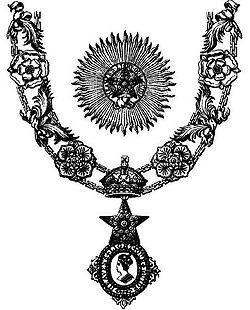GCSI
| Most Exalted Order of the Star of India | |
|---|---|

Insignia of a Knight Grand Commander of the Order of the Star of India
|
|
| Awarded by Sovereign of the United Kingdom |
|
| Type | Order |
| Motto | HEAVEN'S LIGHT OUR GUIDE |
| Awarded for | At the monarch's pleasure |
| Status |
Not awarded since 1947 Dormant order since 2009 |
| Sovereign | Elizabeth II |
| Grades | Knight Grand Commander(GCSI) Knight Commander(KCSI) Companion(CSI) |
| Former grades | Knight Companion |
| Statistics | |
| Established | 1861–2009 |
| Precedence | |
| Next (higher) | Order of the Bath |
| Next (lower) | Order of St Michael and St George |
|
Ribbon bar of the Star of India |
|
The Most Exalted Order of the Star of India is an order of chivalry founded by Queen Victoria in 1861. The Order includes members of three classes:
No appointments have been made since the 1948 New Year Honours, shortly after the Partition of India in 1947. With the death of the last surviving knight, the Maharaja of Alwar, the order became dormant in 2009.
The motto of the order is Heaven's light our guide. The "Star of India", the emblem of the order, also appeared on the flag of the Viceroy of India and other flags used to represent British India.
The order is the senior order of chivalry associated with the Indian Empire (British Raj); the junior order is the Most Eminent Order of the Indian Empire, and there was also, for women only the Imperial Order of the Crown of India. It is the fifth-most-senior British order of chivalry, following the Most Noble Order of the Garter, the Most Ancient and Most Noble Order of the Thistle, the Most Illustrious Order of Saint Patrick, and the Most Honourable Order of the Bath.
Several years after the Indian Mutiny and the consolidation of Great Britain's power as the governing authority in India, it was decided by the British Crown to create a new order of knighthood to honour Indian Princes and Chiefs, as well as British officers and administrators who served in India. On 25 June 1861, the following proclamation was issued by the Queen:
...
Wikipedia
